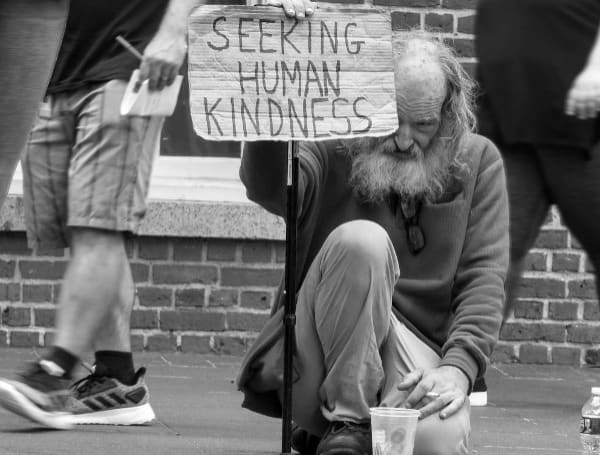Los Angeles residents could end up shelling out even more tax dollars towards the city’s homeless crisis, adding to the billions already spent in an effort to tackle the issue.
Voters will decide whether to enact Measure A in November, which imposes a .5% county-level sales tax to help fund homelessness programs. Another initiative, known as Measure H, passed in 2017 with the sales tax at .25% for 10 years and would be repealed if Measure A passes.
Measure A’s proponents argue that letting Measure H expire in 2027 without a replacement would be disastrous for the 75,000 homeless people in Los Angeles County, according to Politico.
“We need everyone in Los Angeles County to understand that if Measure A does not pass, critical funding for homeless shelter services and housing will be lost,” Democratic Los Angeles Mayor Karen Bass said at a press conference Monday, according to Politico. “We cannot afford to go backward.”
Polling shows 49% of likely voters support Measure A, 33% are planning to vote no and 17% being undecided, according to a UC Berkeley poll conducted Sept. 25 to Oct.1. Currently, there is no organized opposition to the measure, according to Politico.
Mark DiCamillo, director of the Berkeley poll, told the Los Angeles Times that there is growing skepticism on the effectiveness of Measure H on tackling homelessness, affecting Measure A’s chances of passing.
“That’s the sticking point on this whole thing,” DiCamillo told the Los Angeles Times. “Survey respondents want to see progress, and they really haven’t seen a lot yet. Our August poll showed some dissatisfaction. There is some skepticism about what this is likely to do.”
READ: Senate Dems Publicly Accuse McDonald’s Of Price Gouging Immediately After Trump’s Visit
Los Angeles County poured $527 million into the homeless crisis in fiscal year 2021-2022, and threw another $532 million at homelessness in fiscal year 2022-2023. In February 2024, Los Angeles County’s Homeless Initiative approved $783 million in spending for fiscal year 2024-2025.
However, it would cost an estimated $2.2 billion per year to end homelessness in the city within a decade, according to a Los Angeles Housing Department report published Oct. 1. Bass declared homelessness an emergency upon assuming office in 2022.
Despite the outpouring of cash, homelessness in Los Angeles County dipped only .27% in 2024, and 2.2% in the city, according to county statistics. Los Angeles has the second largest homeless population in the U.S., trailing only New York City, according to the U.S. Department of Housing and Urban Development in 2023.
READ: US Sheriffs Sound Alarm On Biden-Harris Migrant Crisis Taking Over America’s Small Towns
“I think that there’s a lot of frustration out there, and that’s going to show up in the vote totals,” United Way of Greater Los Angeles Vice President Tommy Newman, who is involved in the “Yes on A” campaign as its top funder, told Politico. “But when folks learn what’s at stake, the risk of a 28% increase [in homelessness] if the funding expires, how this is different [from previous measures] with increases in prevention and housing, it moves a lot of those undecideds to yes.”
Bass’ office did not immediately respond to the Daily Caller News Foundation’s request for comment.
Please make a small donation to the Tampa Free Press to help sustain independent journalism. Your contribution enables us to continue delivering high-quality, local, and national news coverage.
Android Users: Download our free app to stay up-to-date on the latest news.
Connect with us: Follow the Tampa Free Press on Facebook and Twitter for breaking news and updates.
Sign up: Subscribe to our free newsletter for a curated selection of top stories delivered straight to your inbox.

First published by the Daily Caller News Foundation.

